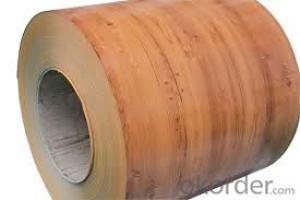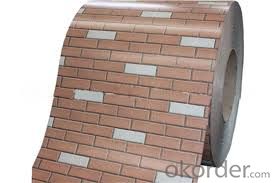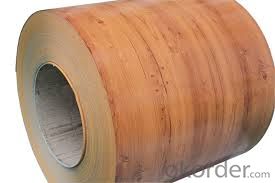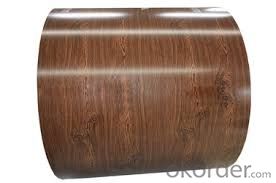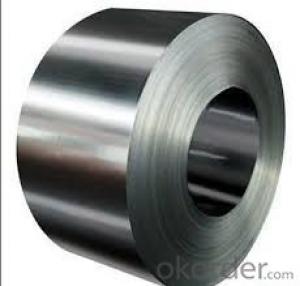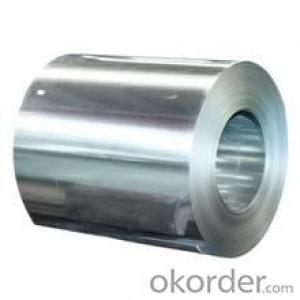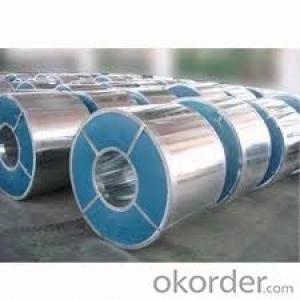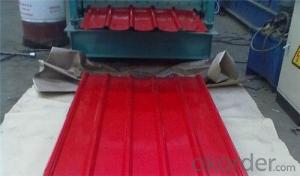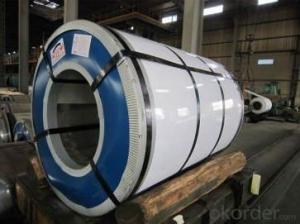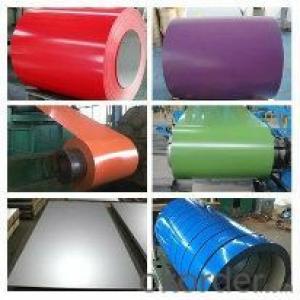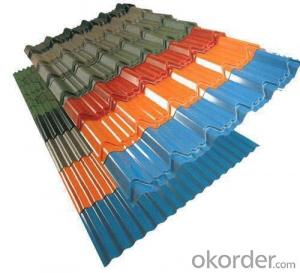Color Coated Galvanized Steel Rolled for Floor/Color Steel Rolled
- Loading Port:
- Shanghai
- Payment Terms:
- TT OR LC
- Min Order Qty:
- 20 m.t.
- Supply Capability:
- 18000 m.t./month
OKorder Service Pledge
OKorder Financial Service
You Might Also Like
Product Description
Product Description
1. Strong resistance to corrosion, the service life can reach 25years.
2. Superior heat resistance, Galvalume shows no discoloration and oxidation at 315.
3. Fantastic silver color on the surface
4. Excellent heat reflection
5. Simple and easy construction
6. Excellent printability
Major Application:
Widely used in Construction industry, home appliance automobile industry, color coated sheet and industrial instrument etc.
Advantages of Our Prepainted Galvanized SteelCoil
1. Excellent corrosion resistance: The zinc layer provides a good protection of Pre-painted Galvanizeed Steel Sheet.
2. High heat resistance: The reflective surface of the material aids in efficiently reflecting the sunlight away and in turnreducing the amount of heat transmitted.
The thermal reflectivity converts into energy savings.
3. Aesthetics: Pre-Painted Galvanized steel sheet is available in plethora of patterns and multiple sizes as per the requirements that given by our customers.
4. Versatility: Can be used in the various areas.
Applications of Prepainted Galvanized SteelCoil
1. Buildings and constructions: Roofing, ceilings, gutters, venting lines, indoor decorations, window frames, etc.
2. Electrical appliances: Computer shells, washing machines, refrigerators, dehumidifiers, video recorders, water heaters, etc.
3. Agricultural equipments: Troughs, feeding tools, agricultural driers, irrigation channels, etc.
4. Vehicle parts: Back-seat plates of buses and trucks, conveying systems, oil tanks, etc.
| Thickness | 0.16mm-1.6mm |
| Width | 600mm-1250mm,or customized |
| Coil ID | 508mm/610mm |
| Zinc-Coating | 60-275g/m2 |
| Grade | Q195-Q235 and SPCC,SPCD,SPCE,SGCC(DX51D+Z),SGCD(DX52D |
| Coil Weight | Customized |
| Color | RAL number or sample color |
| Standard | JIS G3302,JIS G3312,ASTM A653M/A924M 1998 |
| Capacity | about 15,000 tons per month for coil product |
| Surface structure | Galvanized,Zero spangle,regular spangle or normal spangle |
| Coating | Topside:5micron primer+15-20microns polyester |
| Backside:5-8micron primer epoxy | |
| Surface treatment:chromated,oiled, non-oiled |
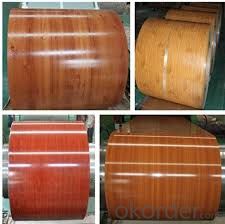
Q&A What is your acceptable payment term?
ANSWER:TT,LC,OA etc
- Q: What are some of the greatest steel guitar songs in the history of country music. Western swing applies also.
- Bob okorder /
- Q: How are steel coils used in the production of conveyor systems?
- Steel coils are used in the production of conveyor systems as they are formed into various components such as conveyor belts, pulleys, and rollers. These components provide strength, durability, and flexibility to the conveyor system, ensuring smooth movement of materials along the conveyor and enhancing its overall performance.
- Q: All the steel straps that secure my deck and stair 6x6 posts to the concrete piers have some rust on them. Had bought a rust reducer to spray on them and repaint. As I went to do this I found that one of them is on its last legs, with the steel rusted through and bubbling up all up the sides of the straps. Since this is the end post on a row of 3 deck support posts, I was thinking of removing as much rust as possible, then paint with Rustoleum and cover lower post with something to keep water away from post and pier in the future? Was thinking of something removeable so I could check on it for further rusting. What do you folks with building experience think of this? Thanks.
- If these steel straps are rusting through and on their last legs, a coat of paint is going to be cosmetic at best. Replace these straps with new ones. The originals were either very poorly galvanized, or you live someplace with a very corrosive environment. In any event, paint can't save this sort of thing. Steel brackets serve a real purpose, and after they're weakened, they can't do that anymore. How would your home hold up in an earthquake, for example? What you're proposing doesn't sound safe.
- Q: How are steel coils used in the production of aerospace components?
- Steel coils find multiple applications in the production of aerospace components. One primary use involves their use in the manufacturing of structural parts like frames, beams, and brackets. To achieve this, steel coils are often transformed into flat sheets or strips, which are subsequently cut and shaped into the desired form for these components. Given the strong and durable nature of steel, it is an ideal material for these critical parts that must withstand extreme forces and conditions. Moreover, steel coils are also indispensable in the production of engine components, including turbine blades and combustion chambers. These components demand materials with exceptional mechanical properties and high resistance to elevated temperatures. Consequently, steel coils undergo processing and shaping to create intricate forms, ensuring the efficient and reliable functioning of these vital engine parts. Furthermore, steel coils play a crucial role in the production of fasteners, such as bolts, nuts, and screws, which are essential for assembling various aerospace components. The exceptional strength and corrosion resistance of steel make it the preferred choice for these fasteners, as they must endure the intense forces and harsh environments encountered during flight. In summary, the utilization of steel coils is of utmost importance in the production of aerospace components, as they provide the necessary strength, durability, and reliability required for safe and efficient operation in the demanding aerospace industry.
- Q: Can steel coils be coated with polymer?
- Yes, steel coils can be coated with polymer.
- Q: How are steel coils used in the manufacturing of suspension arms?
- Steel coils are used in the manufacturing of suspension arms as they provide the necessary strength and flexibility required to absorb shocks and vibrations, ensuring a smooth and stable ride. The coils are typically placed around the suspension arm and compressed under the weight of the vehicle, allowing them to act as springs, supporting the weight of the vehicle and maintaining proper suspension alignment.
- Q: What are the different methods of joining steel coils?
- There are several methods of joining steel coils, including welding, mechanical fastening, adhesives, and interlocking systems. Welding involves fusing the ends of the coils together using heat or pressure. Mechanical fastening includes using bolts, screws, or other fasteners to hold the coils together. Adhesives can be used to bond the coils, providing a strong and durable connection. Interlocking systems involve designing the coils with special shapes or profiles that fit together, creating a secure joint.
- Q: What are the factors that affect the quality of steel coils?
- There are several factors that can affect the quality of steel coils. Firstly, the composition of the steel itself plays a crucial role in determining its quality. The presence of impurities, such as sulfur or phosphorus, can adversely affect the strength, durability, and overall performance of the steel. Additionally, the carbon content, alloying elements, and heat treatment of the steel also contribute to its quality. Secondly, the manufacturing process and techniques used during the production of the steel coils can significantly impact their quality. Factors such as the cleanliness of the production environment, the precision of the rolling and cooling processes, and the control of temperature and pressure during manufacturing can all influence the final quality of the coils. Furthermore, the surface quality of the steel coils is also a crucial factor. Any defects or imperfections on the surface, such as scratches, dents, or corrosion, can compromise the integrity and functionality of the coils. Proper handling, storage, and transportation of the coils are essential to maintaining their surface quality. Moreover, the mechanical properties of the steel coils, including tensile strength, yield strength, and elongation, are essential indicators of their quality. These properties depend on various factors, such as the type of steel, its thickness, and the processing conditions. Lastly, external factors such as environmental conditions, such as humidity and temperature, can affect the quality of steel coils. Exposure to moisture or extreme temperatures can lead to corrosion or other forms of degradation, impacting the overall quality and longevity of the coils. In conclusion, the quality of steel coils is influenced by several factors, including the composition of the steel, the manufacturing process, surface quality, mechanical properties, and external environmental conditions. It is crucial to ensure that these factors are carefully controlled and monitored to produce high-quality steel coils that meet the desired specifications and standards.
- Q: How are steel coils used in the appliance industry?
- Steel coils are used in the appliance industry to manufacture various components such as outer panels, frames, and internal structures of appliances like refrigerators, washing machines, and ovens. The coils are processed to create specific shapes and sizes, providing strength, durability, and stability to the appliances.
- Q: How are steel coils used in the production of storage tanks?
- Steel coils are typically used as the raw material in the production of storage tanks. These coils are formed into sheets and then shaped and welded to create the tank's body. The strength and durability of steel make it an ideal choice for storing various substances, including liquids and gases, ensuring the safety and longevity of the storage tanks.
Send your message to us
Color Coated Galvanized Steel Rolled for Floor/Color Steel Rolled
- Loading Port:
- Shanghai
- Payment Terms:
- TT OR LC
- Min Order Qty:
- 20 m.t.
- Supply Capability:
- 18000 m.t./month
OKorder Service Pledge
OKorder Financial Service
Similar products
Hot products
Hot Searches
Related keywords

